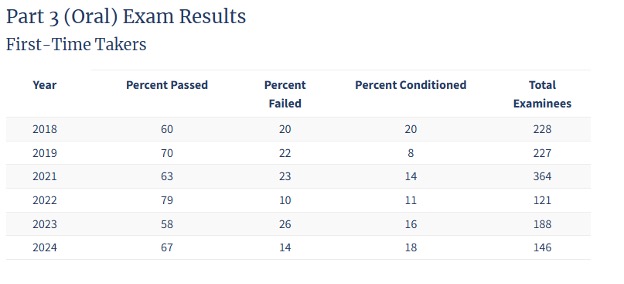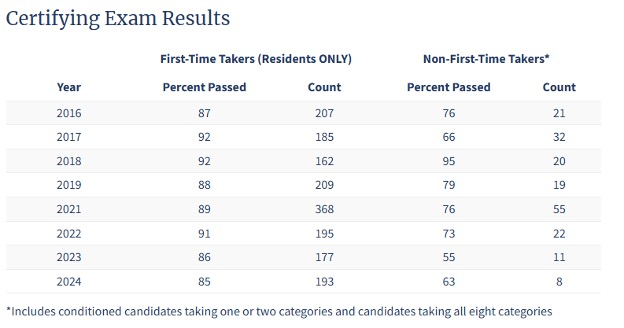Pass Rates for Medical Physicists

Obtaining board certification is vital to a medical physics career, and the path to becoming a board-certified medical physicist is not an easy one. The traditional route to board certification from the American Board of Radiology requires graduation from a CAMPEP-approved graduate program, completion of a 2-year residency, and passing three board examinations, each offered only once a year. Part 1 of the board exam is a general radiation physics test. Part 2 is a written test in your specialty (radiation therapy, diagnostic imaging, or nuclear medicine). Part 3 is a 2 ½-hour oral exam. Given the long path and the hurdles along the way, the pass rate for the final oral exams is astonishingly low and not passing it can be devastating to a physicist’s career.
At every step of the process, the hopeful physics student runs the risk of being cut from the medical physics track. CAMPEP-approved graduate programs only accept a certain number of the students that apply. They are challenging and have their own attrition rates for those who make it in but can’t handle the difficult content. For many professions that require an advanced degree and training, this is where they separate the wheat from the chaff.
Once their academic program is complete, medical physics graduates must apply and be accepted to a CAMPEP-approved residency. Although the number of residency spots continuous to increase, there are still not enough slots for everyone who graduates. This leaves some graduates in a holding pattern, hoping to get a spot the next year.
Those that make it into a residency program work directly under a board-certified medical physicist for 2 years. They clinically handle the day-to-day work and receive a well-rounded education as overseen by the accrediting body. Again, for other professions, like medical doctors, this grind of residency shows who is cut out for the difficult profession. During this time, the medical physics residents prepare for the written boards and begin taking them. Since the components of the board exams are a year apart, residents typically do not take the oral boards until they have graduated and are already working as a medical physicist.
In 2024, only 67% of physicists who took the oral boards for the first time passed unconditionally. In 2023, that number was 58%. The table below was published by ABR:

While some may consider this a rite of passage or the high bar that needs to be in place to maintain the excellence of our profession, it begs the question of why such a large number do not pass. The physicists who are taking these oral boards have spent nearly 5 years learning and working within the profession. They have survived the cut many times and have proven their worth in school, in residency, and in working daily in the field. Yet from the oral board results, the ABR does not think that one-third of the physicists who have made it this far are worthy of board certification.
Compare the above rates with the radiation oncologist pass rates listed below (also from the ABR website):

The percentage of radiation oncologists who pass their oral boards is significantly higher year after year than the medical physicists. What accounts for this discrepancy? Both professions go through multiple stages of rigorous training prior to attempting this final gate. Does training for physicists need to be shored up in some way? Are the oral exam criteria for physicists more stringent than for oncologists?
Come this spring, there will be a feeding frenzy for medical physics residents who are graduating. The already tight and understaffed market for physicists will not be satiated with one new class. The pressure to obtain board certification within a year or two of hire will be enormous for both the physicist and the facility. Board certification is tied to department accreditation, state regulatory requirements and staffing. It is a difficult path indeed to become a fully board-certified medical physicist.
